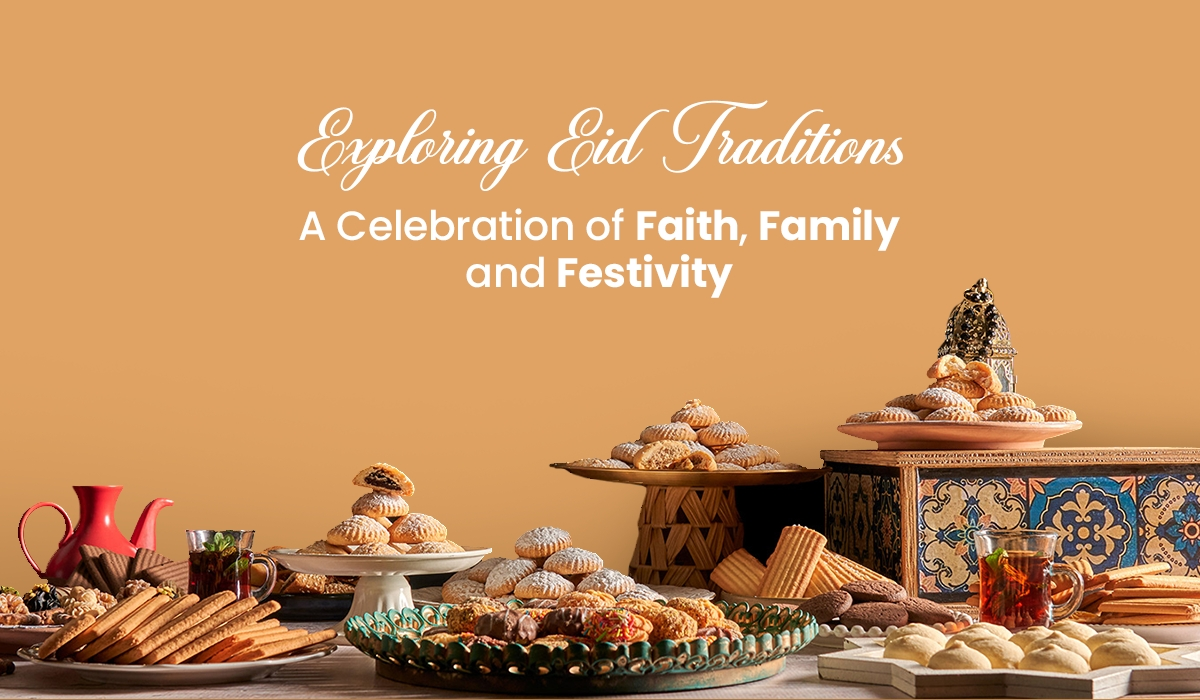
Exploring Rich Eid Traditions: A Celebration of Faith, Family, and Festivity
Eid, the joyous occasion celebrated by Muslims worldwide, is not just a religious festivity; it's a tapestry woven with vibrant traditions, cultural richness, and profound spiritual significance. As families and communities come together to mark this auspicious occasion, they partake in a myriad of timeless customs that deepen bonds and foster a sense of belonging. Join esajee as we delve into the enchanting world of Eid traditions, where every ritual embodies the essence of faith, unity, and gratitude.
Understanding Eid Traditions
Eid al-Fitr and Eid al-Adha stand as the two pillars of Eid celebrations, each with its unique set of traditions. Eid al-Fitr, marking the end of Ramadan, begins with the Fajr prayer followed by the special 'Eid Salah.' Before heading for prayers, Muslims offer 'Zakat al-Fitr,' a form of charity to ensure everyone can partake in the festivities. After prayers, families exchange warm embraces, heartfelt greetings, and delectable sweets, symbolizing the spirit of generosity and camaraderie.
On the other hand, Eid al-Adha, the Festival of Sacrifice, commemorates Prophet Ibrahim's unwavering devotion to God. The day begins with prayers and a sermon, followed by the sacrifice of an animal, usually a goat, sheep, or cow. This act symbolizes Prophet Ibrahim's willingness to sacrifice his son as an act of obedience to God. The meat from the sacrifice is divided into three parts: one for the family, one for relatives and friends, and one for the less fortunate, emphasizing the importance of sharing blessings with others.
Family Traditions
Eid is synonymous with familial warmth and togetherness, where generations gather to create cherished memories and uphold cherished customs. From donning new clothes, often in vibrant hues, to preparing elaborate feasts infused with traditional flavors, every aspect of Eid revolves around family unity. The exchange of gifts, especially for children, adds to the joyous atmosphere, fostering a sense of love and belonging.
Moreover, visiting relatives and neighbors is an integral part of Eid celebrations, strengthening social bonds and spreading goodwill. It's a time when homes resonate with laughter, storytelling, and the aroma of delectable dishes, creating an ambiance of joy and harmony.
Cultural Significance
Eid transcends geographical boundaries, embracing diverse cultures and customs while retaining its core values. In different parts of the world, unique traditions adorn Eid celebrations, adding layers of richness to the festivities. Whether it's the colorful bazaars of Pakistan adorned with lanterns and textiles or the lively street processions in Indonesia, each region infuses its cultural flair into the Eid festivities.
Moreover, traditional attire plays a significant role in Eid celebrations, with outfits reflecting regional styles and customs. From the elegant 'shalwar kameez' in Pakistan to the flowing 'thobes' in the Middle East, attire not only symbolizes cultural identity but also adds splendor to the occasion.
Gratitude for Food
Eid is not only a time for joyous celebration and communal gatherings but also a profound expression of gratitude, particularly for the blessings of food and sustenance. As families come together to mark this auspicious occasion, they do so with hearts filled with appreciation for the abundance of food that graces their tables. From the early morning feast after Ramadan's fasting to the lavish spreads prepared for Eid al-Adha, each dish symbolizes the providence and generosity of Allah. It's a time when the act of sharing meals becomes an act of gratitude, fostering a deeper sense of appreciation for the blessings bestowed upon us. Through the ritual of breaking bread together, Muslims express their gratitude not only for the nourishment of the body but also for the spiritual sustenance that strengthens their faith and bonds them with their loved ones. In essence, Eid serves as a reminder to cherish the food we are blessed with and to extend kindness and generosity to those in need, embodying the true spirit of gratitude and abundance.
Celebrate Your Eid With Esajee
As we immerse ourselves in the tapestry of Eid traditions, one thing becomes abundantly clear – the essence of Eid lies in its ability to unite hearts and souls, transcending differences and embracing diversity. At Esajee, we understand the importance of preserving these cherished traditions and celebrating the spirit of Eid with fervor and joy. As you embark on your Eid preparations, let Esajee be your trusted companion, offering a delightful array of traditional treats, festive decor, and thoughtful gifts to make your celebrations truly memorable. Eid Mubarak!
FAQS
What are some common Eid traditions?
Common Eid traditions include attending special prayers at mosques, exchanging greetings and gifts with family and friends, sharing festive meals, giving to charity, and visiting relatives and neighbors to spread joy and goodwill.
How do Muslims greet each other on Eid?
The most common greeting exchanged on Eid is "Eid Mubarak," which translates to "Blessed Eid."
What are some traditional Eid foods?
Traditional Eid foods vary across different cultures but often include dishes such as biryani, kebabs, samosas, baklava, sheer khurma, and maamoul, among others.
How long do Eid celebrations typically last?
Eid celebrations usually last for one to three days, depending on cultural and regional customs, with the first day being the most significant.






